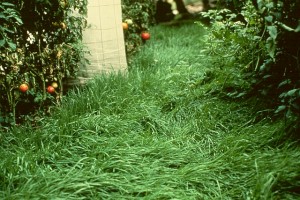 Have you had problems in your vegetable garden? If so, now is the time for all good gardeners to take action, especially if you have nematodes! Nematodes are small, microscopic, worm-like animals that live in the soil and feed on the roots of developing plants. Their damage is observed as decayed spots on the roots, stubby roots, enlarged root tips, sparse root systems or galls on the roots. Although several types of nematodes are found in vegetables and flower gardens, the root knot nematode which causes galls or swelling on plant roots, is the most damaging. Plants infested with root knot nematodes usually are stunted, yellow in color, and often die prematurely.
Have you had problems in your vegetable garden? If so, now is the time for all good gardeners to take action, especially if you have nematodes! Nematodes are small, microscopic, worm-like animals that live in the soil and feed on the roots of developing plants. Their damage is observed as decayed spots on the roots, stubby roots, enlarged root tips, sparse root systems or galls on the roots. Although several types of nematodes are found in vegetables and flower gardens, the root knot nematode which causes galls or swelling on plant roots, is the most damaging. Plants infested with root knot nematodes usually are stunted, yellow in color, and often die prematurely.
When removing non-productive garden plants, examine root systems for the presence of nematode “knots” or galls. In the case of extreme infestation, the knots may slough off and not be present when the plants are removed. Good healthy roots should be white and firm if not damaged by nematodes. Roots which are decayed or rotted may indicate the presence of nematodes in your garden.
If nematodes are found to be in the garden area, NOW is the time to take action to prevent damage to the spring garden. After removing old, non-productive plants, the gardener is faced with the prospect of an empty garden for the next two or three months. To add greenery to the garden, as well as eliminating some of the nematodes, plant cereal rye (Elbon). Gardeners who have a nematode infestation MUST use cereal rye for nematode population control or face decreased production next spring.
Cereal rye has proven to be the fastest growing, most cold-tolerant annual grass available. You can plant cereal rye in late fall and have a thick mat of grass about 10 to 15 inches high in late winter. This grass should be shredded with a lawnmower or flexible string trimmer and tilled into the soil so decomposition can occur before you plant in the spring. Ideally shredding and tillage one month before planting will allow for adequate decomposition.
There are many advantages to following this practice of planting cereal rye in your garden: (1) it beautifies the area with greenery, and (2) it will add high levels of organic matter to the garden soil. This type of “green manure” crop decomposes rapidly. If these benefits were not enough, the roots of cereal rye serve as a trap-crop for nematodes. Once nematodes enter the cereal rye roots, they cannot escape and are doomed. When cereal rye decomposes, it releases organic acids which help reduce the alkalinity of garden soil. Gardeners should be careful to purchase cereal rye (Elbon) rather than annual rye. Annual rye is used to over-seed lawns and should not be used in your vegetable garden.
Cereal rye can be planted by merely seeding directly on top of the garden soil and raking in. Apply seed at about the rate of 3/4 to one pound per hundred square feet of garden area to insure good coverage and adequate growth. Raking gives seeds some coverage. Be sure to water the rye regularly and fertilize with any type of fertilizer every three weeks for maximum growth. Remember that most of the organic material produced is in the root system rather than the top foliage. Shred rye and till the soil one month before planting so that the massive rye root system will have adequate time to decompose.
To review, planting cereal rye (Elbon) grass seed into your barren garden areas this time of the year will help reduce the population of parasitic root knot nematodes. It will also contribute in adding organic matter to the soil, as well as decorate your neighborhood with greenery all winter long. If seeds are not available from local nurseries/garden centers, or feed stores, please contact Douglas W. King Seed Company at (210) 661-4191.
Remember, Learn and Have Fun!
David Rodriguez is the County Extension Agent-Horticulture for Bexar County. He represents Texas Cooperative Extension with the Texas A&M University System. For any landscape or gardening information, call the Bexar County Master Gardeners Hotline at (210) 467-6575, e-mail questions to mg-bexar@tamu.edu, or visit our County Extension website at https://bexar-tx.tamu.edu/.
Special Note: Listen to live broadcast of the Home & Garden Show with David Rodriguez & Bill Rohde on WOAI 1200 AM, every Saturday morning between 8:00-11:00 a.m., and call in your gardening questions at (210) 737-1200 or 1-800-383-9624. Check it out!